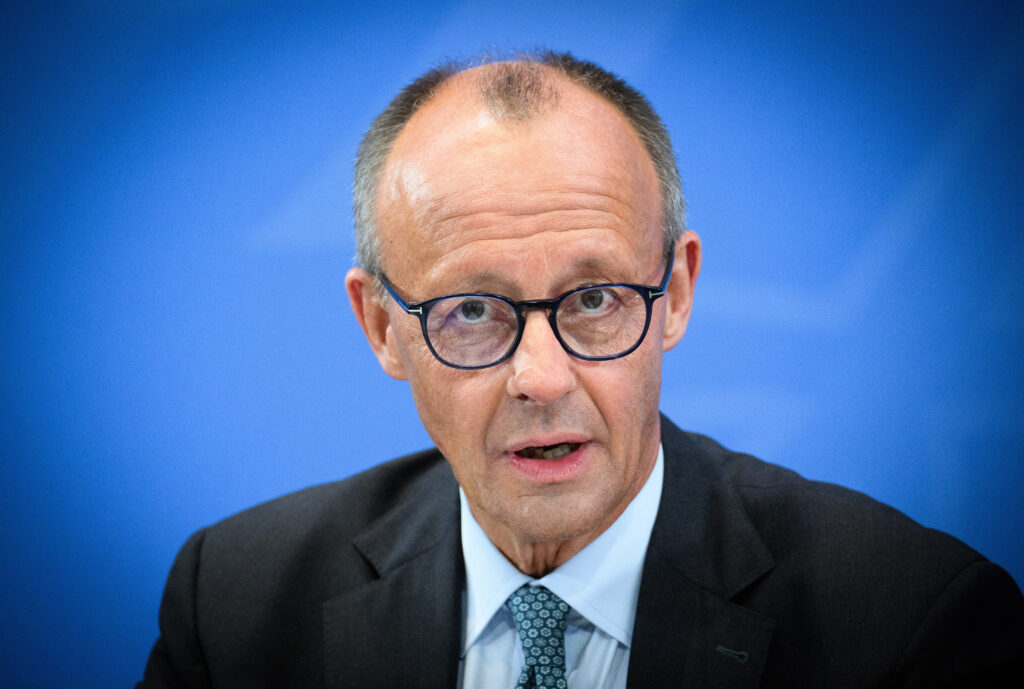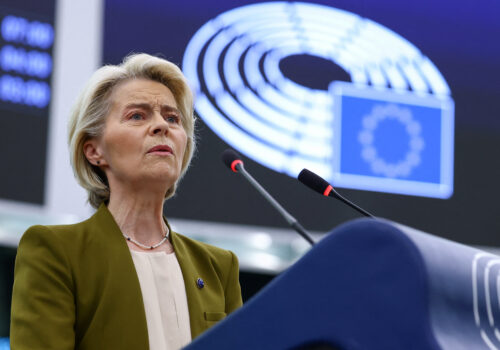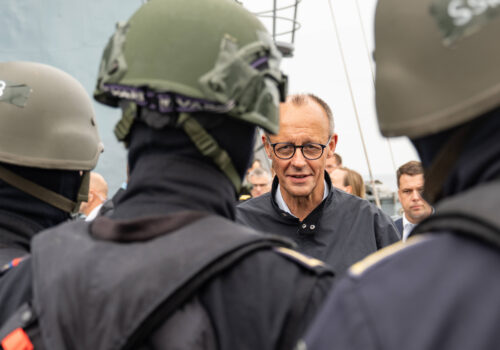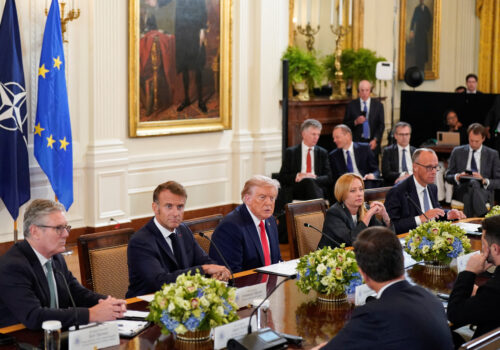Since taking office in May, German Chancellor Friedrich Merz has earned international praise for his assertive approach to foreign policy as he tries to turn around years of sluggish decision making and handwringing about Germany’s role in Europe and the world. Merz has demonstrated his hope that Germany will regain a position of responsibility and leadership through early foreign trips made by the chancellor and by members of his cabinet. His administration has signaled that “Germany is ready to act again as a strong partner” by taking forward-leaning positions on Ukraine while working to strengthen ties with the United States even amid friction over trade and security.
This international momentum, however, contrasts sharply with mounting domestic pressures in Germany that threaten to undermine his agenda. Merz’s country faces severe fiscal constraints, with the general government deficit amounting to €118.8 billion in 2024, which is €15 billion higher than in 2023. The German public is also deeply averse to social spending cuts, which are necessary to help bring down spending. Merz did successfully push through approval to loosen strict debt rules, which paves the way for higher defense spending and hundreds of billions of euros in debt-financed defense and infrastructure spending. However, the underlying structural challenges for Germany’s export-driven economic model remain unsolved.
After years of concerns over underinvestment and economic stagnation, Germany must confront these fundamental issues. Germany’s economy has productivity gaps that must be addressed, and its infrastructure is aging. Modernizing the Bundeswehr and carrying out a climate transition are massively expensive endeavors, as well. Then there’s the deeply intertwined trade relationship between Germany and China that must be managed. Taken together, these issues threaten to create a perfect storm of challenges at home, severely constraining Merz’s ambitious international leadership aspirations.
Support for Ukraine
Beyond Merz’s robust bilateral support for Ukraine, his government now faces the delicate challenge of navigating discussions around a broader “Coalition of the Willing” that could provide long-term security guarantees for the embattled nation following a cease-fire. Twenty-six countries are ready to either send troops to Ukraine as part of a reassurance force or provide assistance on land, sea, or in the air as part of future security guarantees. European officials have cited figures of between ten thousand and thirty thousand troops to describe what has been termed a “reassurance force” designed to enforce any eventual cease-fire. The problems, however, are twofold. First, the United States has said that it will provide air defense support as part of Ukraine’s future security guarantees, but it certainly won’t provide boots on the ground. Second, and perhaps even more important, there’s no cease-fire in place, and it doesn’t appear that there will be one anytime soon.
For Germany, engaging in these discussions without a cease-fire presents significant political risks on the domestic front. The far-right Alternative für Deutschland (AfD), the populist Bündnis Sahra Wagenknecht (BSW), and the left-wing Die Linke are all quite comfortable using the debate around a peacekeeping force in Ukraine to stoke fear in their voters. The AfD—at present the second most popular party in Germany—has accused the government of taking “dangerous and irresponsible” steps, while Die Linke has opposed NATO in general and German troop deployments to Ukraine in particular.
This creates a challenging political calculus for Merz: Some argue that early engagement in coalition planning is necessary to ensure Germany maintains influence over the security architecture and demonstrates credible deterrence against Russia. Others contend that discussing troop deployments before achieving a cessation of hostilities only provides ammunition for extremists on both sides. This debate presents a potential flashpoint that could energize opposition forces and complicate Merz’s domestic coalition management, even as Germany’s European partners move forward with detailed planning for post-conflict security arrangements.
More generally, the debate keeps the issue of Germany’s support for Kyiv near the top of the political agenda and open to exploitation by hard-right and hard-left actors. Against the backdrop of a worsening fiscal outlook and the need for spending cuts, the AfD, BSW, and Die Linke are all arguing that assistance to Ukraine comes at the expense of welfare programs at home. In local elections in Germany’s most populous state, North Rhine-Westphalia, on September 14, this strategy seems to have gained little traction with voters. But it remains a potentially vulnerable flank for Merz and his coalition.
Between Berlin and Beijing
Germany has long found itself walking a diplomatic and economic tightrope in its relationship with China, trying to balance legitimate security concerns with the reality of deeply entrenched business ties. Under the previous government of former Chancellor Olaf Scholz, this tension was illustrated by the controversial COSCO Hamburg port deal. Scholz granted China’s state-owned shipping giant COSCO permission to buy a 24.99 percent stake in Hamburg’s container terminal, despite objections from six government ministries and some of his own officials. The decision highlighted how Germany’s economic dependence on China—which remains Germany’s second-largest trading partner at roughly €246 billion in two-way trade in 2024—often supersedes security considerations.
However, there are signs that the Merz government is looking to take a different approach. It recently convinced a North Sea wind farm developer to abandon plans to use Chinese wind turbines. Germany’s stance is crucial for shaping the European Union’s (EU’s) China policy: as Europe’s largest economy and China’s biggest trading partner in the bloc, German reluctance to decouple has historically constrained broader European efforts to take a tougher line against Beijing. An evolution of Germany’s approach from viewing the relationship primarily through an economic lens to recognizing China as a potential security threat could determine how much the EU can present a united front in addressing China’s growing assertiveness.
At home
As evidence of his focus on international affairs, Merz took eight foreign trips in his first few weeks as chancellor—a lot for a new leader. However, this attention abroad risks distracting from the brewing economic crisis at home. Despite constitutional reforms allowing for massive spending increases, including a €500 billion fund for Germany’s infrastructure over the next twelve years, the government faces the harsh reality that budget deficits will potentially reach 4.5 percent of gross domestic product. These are levels not seen since the mid-1970s (outside of specific crisis periods).
At the same time, Germans have grown accustomed to generous social programs and infrastructure investment, yet they also remain deeply skeptical of deficit spending due to long-held cultural attitudes toward debt. Merz’s domestic power base is already proving fragile. As infrastructure needs mount—from crumbling bridges to outdated digital networks—and defense spending demands surge, Merz will inevitably have to balance between fiscal discipline, public expectations, and national security requirements.
So, with all these challenges before them, will Merz and his coalition focus their attention at home or abroad? This, of course, is a false choice. And buying into this binary narrative could lead to a kind of political self-deterrence for the coalition when it comes to Germany’s role in Europe and its support for Ukraine.
Instead, decision makers in Berlin will have to embrace the fact that Europe’s foremost political power and the world’s third-largest economy doesn’t have the luxury of choosing between two distinct problem sets. For better or worse, the current government will have to tackle both its economic renewal and the threat to European security that Russia’s continued aggression poses. Merz seems to have understood that even before he concluded the coalition talks—now his coalition must face up to that reality, as well.
Jörn Fleck is the senior director of the Atlantic Council’s Europe Center.
Rachel Rizzo is a nonresident senior fellow at the Atlantic Council’s Europe Center.
Further reading
Thu, Sep 11, 2025
Von der Leyen’s stirring message to Europe: Fight to survive
Inflection Points Today By Frederick Kempe
“Europe is in a fight,” the European Commission president said during her State of the Union address in Strasbourg on September 10.
Thu, Aug 28, 2025
Germany wants to double its defense spending. Where should the money go?
New Atlanticist By
After decades of Berlin underinvesting in its defense, German Chancellor Friedrich Merz has plans to transform the Bundeswehr into Europe’s strongest military.
Tue, Aug 19, 2025
Europe needs to keep up the momentum for Ukraine after its White House show of force
New Atlanticist By Jörn Fleck, James Batchik
Among other steps, European leaders should press forward on defining what security guarantees for Ukraine look like.
Image: Friedrich Merz, Federal Chancellor and Federal Chairman of the CDU, speaks at a press conference following the first meeting of the coalition committee after the summer break in the Federal Chancellery.



